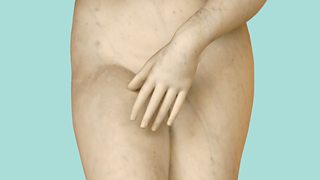How can your menstrual cycle become your superpower in sports?
Team GB’s superstar sprinter, Dina Asher-Smith, says she has been planning her periods since January in preparation for the Tokyo Olympics. All of her major injuries have occurred while menstruating. Chelsea Women’s football team has also started to tailor its players’ training to their menstrual cycles.
So how can athletes use their menstrual cycle to support their performance? Dr Richard Burden is the co-Lead on Female Health & Performance at the English Institute of Sport, and Rebecca Myers is a sports journalist for the Sunday Times. They joined Woman’s Hour to discuss how elite athletes and amateur sports women can harness the power of their periods.

Understand how your period impacts you
“It's really not just a case of bleeding versus no bleeding, pain versus no pain,” says Rebecca Myers. “Hormones are changing all the time in the female body throughout the month and they're very powerful things.
“So there's all these different elements in terms of, you know, when is the best time of the month for recovery? When is the best time for pushing those really difficult sessions in the gym? What should you be eating? How should you be hydrating?
“I spoke to one sports scientist who said that actually she thinks there are probably 50 different things you could do at any given time involving hormones and the menstrual cycle that could change your performance.”
Flip your thought process
“The menstrual cycle doesn't have to be a barrier to performance,” says Richard Burden. “It doesn’t have to be a barrier to training or any aspect of an athlete's life. We've been trying to flip the perception so instead of it being a barrier, can you use your menstrual cycle as a superpower? Can you start to understand it a little bit better?”
“Rather than just looking at the downsides about avoiding the pain or the bloating or the headaches, whatever that might be, we're actually seeing athletes now look at the upsides,” says Rebecca. “Could this be something that we can measure and actually use to our advantage? What could you achieve if you worked with your body throughout the whole month?
“That's certainly the case behind Chelsea tracking their footballers’ periods, and the US national team at the World Cup a couple of years ago actually paid tribute to that as a big part of their success and said it was integral to performing so well.”

Don’t be shy - speak out about it
“I was so pleased to see Dina Asher Smith mentioned it in an interview recently,” says Rebecca. “She said she really wants to talk about it. She wants to make a point of saying she's had to track her period for this long period of time. Because there's a lot of taboos still in this area.
“I've had athletes say to me before that they've come on their period the day before or even hours before a major race and not had the result they wanted. And they’ve had to say: 'Oh I didn't wake up on the right side of the bed'. Because they're worried that it will be seen as using an excuse, because obviously the male dominated world of sport doesn't always understand quite the impact that a period can have.”
Monitor the impact your sport is having on your menstrual cycle
“In some sports, having a period at all has been frowned upon,” says Rebecca. “Having your period stop as an adult woman, which is very dangerous, has actually been celebrated as a sign of hard work.
“Mary Kane, an American runner, came out and spoke about that a couple of years ago and scores of women came forward and said: "My periods stopped while I was training and I was told, well done, you're obviously training really hard." And that is a whole other area where we need to be so careful.”
“Our responsibility is to protect future performance and future health,” says Richard. “It’s not just for the Paris Olympics and Paralympics or future World Championships, but for an athlete's life after they finish competing.
“Our responsibility is to protect them so that they can be successful in their athletic careers but come out of it the other end healthy with no risks to bone health, no risks to fertility, no risks to immune function.”
Listen to the full conversation with Jessica Creighton on Woman’s Hour on ±«Óãtv Sounds. Get involved and join in with the conversation on and @bbcwomanshour.




